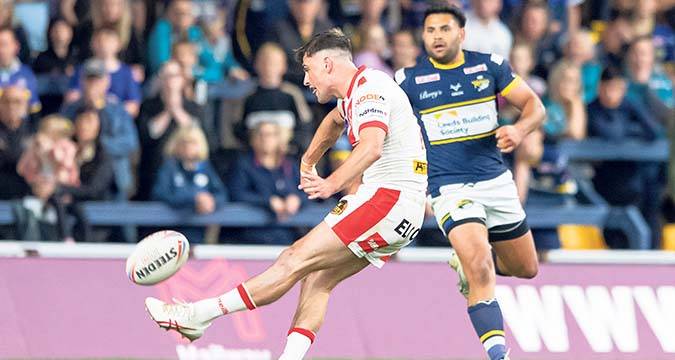
The editor of Rugby League World, Lorraine Marsden, is not a fan of the concept of Golden Point.
DRAMA, intensity, skill, power, memorable endings, talking points, entertainment… they’re all among the reasons we love rugby league. So why then, after two recent games that had all of the above and more, did I feel so deflated? It was perhaps because they also had a winner.
The games on consecutive nights between Hull KR and Wigan, and then Leeds and St Helens at the end of May showed the very best of our great game off to all those in attendance and those watching around the country on television. For those casual followers watching from their armchairs or while having a pint in their local, those games going to Golden Point extra time will almost certainly have made them sit up and, perhaps, take a bit more notice as those additional moments played out. And for the Wigan and Saints fans among them, the very final hooter will have brought about a mixture of relief and ecstasy at taking a valuable two league points over one of their nearest rivals. For Robins and Rhinos followers however, it was a case of so near yet so far.
Admittedly I didn’t see as much of the Hull KR match as I would have liked, but I was at Headingley to see one of the best games I have seen so far this season play out. The atmosphere was electric, both sides gave it their all and Leeds battled on even through losing Aidan Sezer, Harry Newman and Morgan Gannon to injury inside the opening thirty minutes. It was a game I left feeling like neither side should have lost. Sometimes a game feels worthy of a draw and that was one of them.
Don’t get me wrong, I can fully see the need for Golden Point extra time in Cup games where a clear winner is required, but I’ve never been sure of it being used in regular league matches. Surely if the sides haven’t been able to be separated after an intense 80 minutes of action on the field, then they both deserve a share of the spoils?
This game made me even more sure of that, especially after it took another nine minutes of action before either side found a breakthrough – despite their best efforts.
I had been chatting to friends about the merits of Golden Point following Liam Farrell’s late try against Hull KR, so when I was witnessing something similar just 24 hours later I decided to concentrate on one facet of the action more than any other.
Maybe it was down to the crowd noise lifting the players that extra little bit, or simply the knowledge that the next score ended the game, but watching on it looked as if the players were running just as hard, if not harder, hitting just as hard, if not harder, and being hit just as hard, if not harder, than in the previous 80 minutes. That is clearly understandable when those final minutes of extra time require a team to get forward, and into a scoring opportunity, as quickly as possible to try and take the game.
But for a sport that has always, quite rightly, been so focused on player welfare, is it really in a players’ best interests to, perhaps needlessly, put their bodies through these extra moments of high intensity action?
There have been many arguments for and against Golden Point since its introduction in 2019 and one suggestion that has often been made round the subject is that each team gets one competition point if scores are level after 80 minutes, with the victory after extra time, getting a second. That would at least see a reward for the side that had slugged it out for 80 minutes before having to find an eventual winner.
But that would mean games like this seeing three league points awarded, rather than the usual two of every other game, which brings about all sorts of new questions about parity and fairness. So unless the league rules were changed to award three points instead of two for a standard win, this probably wouldn’t be a feasible system. It would also take away from the very concept of Golden Point. As nervy as it is, Golden Point is seen as an all or nothing way of ending a contest, and in the grand scheme of things, losing out on just one league point maybe wouldn’t have as much of an impact as losing out on two.
Love it or hate it, Golden Point is here to stay, and whatever your views on it, we can’t deny it has created some memorable and dramatic moments. And if those moments pull in more supporters and make more people fall in love with the game, then who are we to complain.
First published in Rugby League World magazine, Issue 486 (July 2023)
Click here to subscribe to the print edition of Rugby League World
